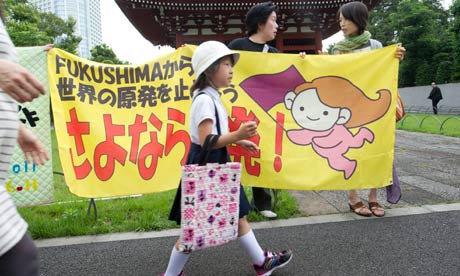Dosimeters to be given to 34,000 children in city 45 miles from Tepco plant after high radiation readings

A Japanese schoolgirl walks past residents of Fukushima prefecture appealing for a halt to nuclear energy outside the Tepco annual shareholders' meeting in Tokyo. Photograph: Everett Kennedy Brown/EPA
Tens of thousands of children living near the Fukushima Daiichi nuclear power plant are to be given personal radiation monitors, as concern grows over the long-term health effects of exposure to radiation.
Dosimeters will be given to 34,000 children aged between four and 15 living in Fukushima city, 45 miles from the plant, after abnormally high radiation readings were recorded in the area.
The risks posed by radiation from the world's worst nuclear accident since Chernobyl have already driven 80,000 people from homes within 12 miles of the plant. Many of the child evacuees from communities that now lie empty attend schools in Fukushima, a city of 300,000 people.
Local authorities have provided monitors to schools outside the exclusion zone, but this is the first time they have been supplied to individual pupils. Data from the dosimeters will be analysed to assess the risks posed by cumulative radiation exposure.
The move, the latest concession to growing parental anger over patchy official information about the risks of radiation exposure, came as the company that operates the plant faced repeated verbal attacks at a rowdy annual shareholders' meeting in Tokyo.
More than 9,000 investors attended the meeting, held at a hotel under heavy police guard, with many berating Tokyo Electric Power [Tepco] executives over their response to the 11 March tsunami, which crashed into the plant and knocked out vital cooling systems to reactors.
The crisis has knocked 85% off the value of Tepco shares and resulted in annual losses of $15bn (£9.4bn). The company also faces a compensation bill that could exceed $100bn, while a government plan to help fund damages claims has yet to be put to a parliamentary vote.
The executives got a more sympathetic hearing from others at the meeting, however, and late on Tuesday afternoon, institutional investors helped vote down a motion by activist shareholders to force Tepco to scrap its nuclear reactors.
The company's new chairman, Tsunehisa Katsumata, opened the meeting with an apology for the accident. "We are working to get out of this crisis as quickly as possible," he said. But his attempts to answer questions were punctuated by heckles and demands for him and the rest of the Tepco board to resign. One man demanded that the utility's executives "jump into the reactors and die", while another said that in feudal times they would have been expected to commit ritual disembowelment.
The meeting was held the same day that Japan's nuclear safety agency said about 15 tonnes of low-level radioactive water had leaked into the ground from the Fukushima plant. Tepco, which is struggling to deal with huge volumes of contaminated water that have built up during the operation to cool damaged reactors, said it was investigating the cause of the leak.
In Fukushima city, a local official said children would be required to wear their dosimeters for three months. "We are still considering whether to expand the programme to include other residents," said Koichi Kato.
The government says radiation levels in the city remain well below those considered dangerous, but dozens of schools lying outside the official exclusion zone have taken extra precaution to protect children.
In some towns, authorities have limited the time children are allowed to pay outside and moved swimming lessons from outdoor pools to sports centres. Many have removed layers of radioactive topsoil from their playgrounds, often at the request of anxious parents.
Anti-nuclear campaigners said Fukushima city's move did not go far enough. "The meters don't protect children from radiation, they simply measure exposure after a certain amount of time," said Aileen Mioko Smith of Green Action. "Children should be moved out of areas where radiation levels are high, not used as guinea pigs."
Last week, a coalition of civic and environmental groups in the Fukushima area issued an emergency petition demanding the evacuation of children and pregnant women from radiation hot spots outside the exclusion zone.
"Since atmospheric radiation levels show no sign of abating, the inhabitants of heavily contaminated areas will continue endure high radiation doses, both externally and internally," they said.;



No comments:
Post a Comment